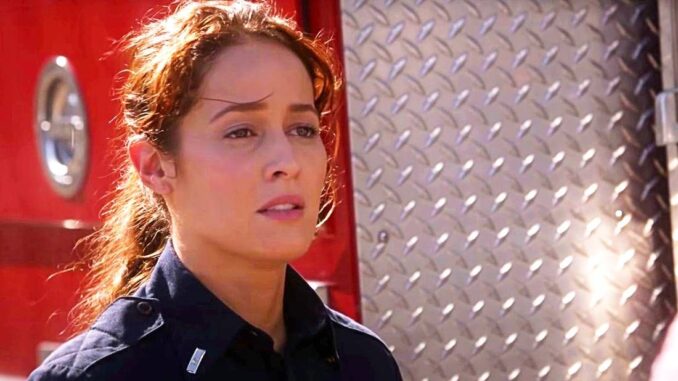
The Enduring Blaze: Station 19 Bids Farewell as Shonda Rhimes Reflects on a Seven-Season Journey
The siren’s wail, a sound synonymous with urgency and a thin line between chaos and salvation, has fallen silent for the firefighters of Station 19. After seven seasons of heart-pounding rescues, searing drama, and unflinching social commentary, the Seattle firehouse closes its doors, leaving behind a legacy etched in the hearts of its devoted audience. As the final embers cool, the spotlight turns to Shonda Rhimes, the visionary architect of the Shondaland universe, whose reflections on Station 19’s journey offer a poignant meditation on creativity, impact, and the bittersweet nature of a story finding its natural end.
From its genesis as a high-octane spin-off of Grey's Anatomy, Station 19 faced the formidable challenge of carving its own distinct identity. It wasn't merely a continuation of Ben Warren's (Jason George) journey from scalpel to axe; it was an expansion of an entire universe, introducing a new breed of heroes who battled not just medical emergencies, but raging infernos, structural collapses, and the invisible scars left by trauma. Rhimes, in her quiet assessment, undoubtedly recognized this initial hurdle. The transition from the sterile, hushed corridors of Grey Sloan Memorial to the cacophonous, smoke-filled chaos of the fireground demanded a shift in tone, a grittier aesthetic, and a new ensemble to lead the charge. The show, under the guidance of showrunners like Krista Vernoff and Zoanne Clack, met this challenge head-on, swiftly establishing a found family in the form of Andy Herrera (Jaina Lee Ortiz), Maya Bishop (Danielle Savre), Vic Hughes (Barrett Doss), and Travis Montgomery (Jay Hayden), among others.
What truly defined Station 19, and what Rhimes's thoughts likely underscore, is its audacious commitment to social relevance. While Grey's Anatomy often explored societal issues through a medical lens, Station 19 plunged into the searing heart of contemporary American issues with a raw, almost journalistic intensity. It was a show that didn't shy away from the harrowing realities of police brutality, systemic racism, the mental health toll on first responders, and the fight for LGBTQ+ rights. We saw our heroes not just putting out fires, but confronting the systemic injustices that fueled societal blazes. The episode depicting the Black Lives Matter protests, where the firefighters faced off against the very system they swore to protect, was a powerful, illustrative example of the show’s willingness to ignite uncomfortable but necessary conversations. Rhimes, a storyteller known for her ability to weave complex social narratives into compelling drama, must look back with immense pride at how Station 19 utilized its platform, transforming entertainment into an urgent call for empathy and change.
Moreover, the heart of any Shondaland production beats through its characters and their intricate relationships. Station 19 was no exception. Rhimes, in her reflections, would surely champion the evolution of Andy Herrera from a shadowed legacy to a formidable leader, a journey characterized by both vulnerability and fierce determination. The groundbreaking relationship between Maya and Carina DeLuca (Stefania Spampinato) – a love story celebrated for its authenticity, its struggles, and its triumphs – became a beacon for representation, illustrating the power of love to transcend adversity. The unwavering friendship between Vic and Travis, their shared grief and enduring support, served as an anchor in a world of constant peril. These weren't just characters reacting to emergencies; they were fully fleshed-out human beings grappling with ambition, love, loss, and the ever-present shadow of danger, a testament to the character-driven storytelling Rhimes has always championed.
Seven seasons is a significant journey in the landscape of television. It’s enough time to explore complex arcs, to deepen relationships, and to leave an indelible mark. For Rhimes, the farewell of Station 19 likely brings a mixture of pride, gratitude, and the natural melancholy that accompanies the conclusion of any long-term creative endeavor. She would reflect on the tireless dedication of the cast and crew, who brought these stories to life with such passion and precision. She would acknowledge the loyal fanbase, the "Station 19 Fam," whose unwavering support fueled the show's run. And most importantly, she would celebrate the show's legacy: not just as a successful spin-off, but as a vital, often prescient voice in the cultural conversation, a show that reminded us that true heroism lies not just in fighting fires, but in fighting for a better world.
As the final credits roll and the stationhouse lights dim, Station 19 leaves behind a powerful afterglow. It was more than just a procedural; it was a mirror held up to society, reflecting our flaws and our strengths, our despair and our boundless capacity for hope. Shonda Rhimes’s thoughts on its seven-season journey would undoubtedly speak to this profound impact, marking Station 19 not as a show that simply ended, but as one that completed its vital, burning mission, its enduring flame illuminating the path forward for stories that dare to matter.
